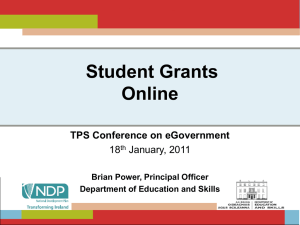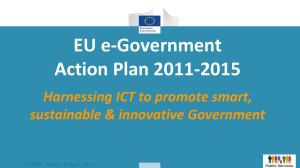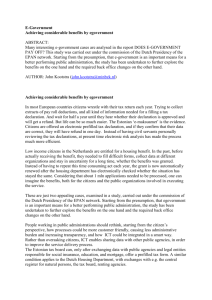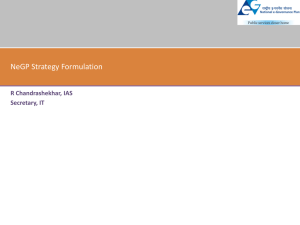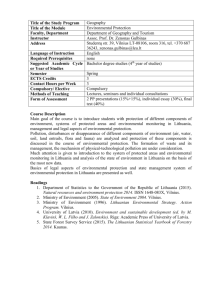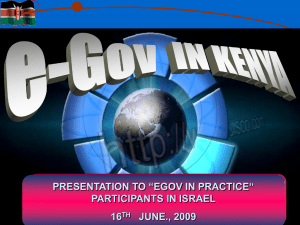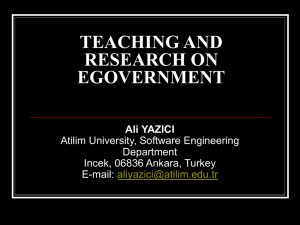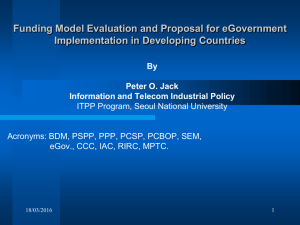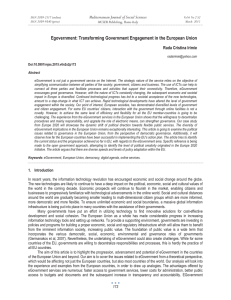212 kb PowerPoint presentation
advertisement
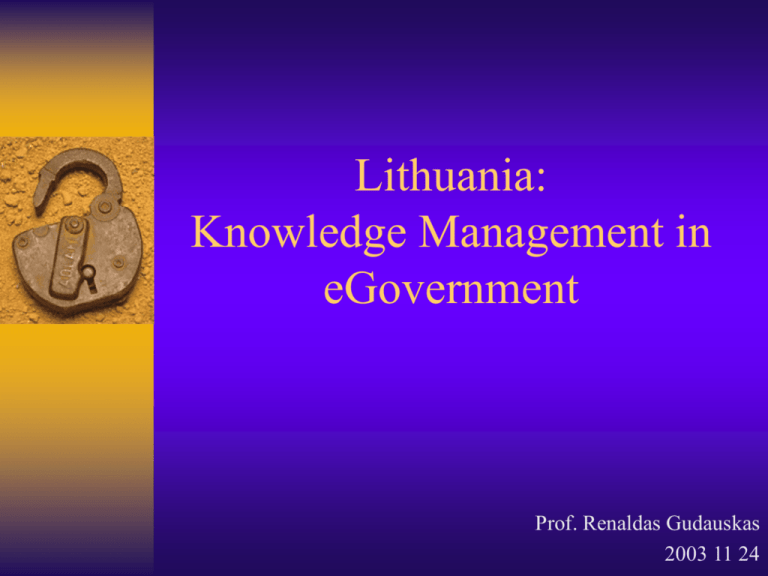
Lithuania: Knowledge Management in eGovernment Prof. Renaldas Gudauskas 2003 11 24 The challenge for Leaders today is to define an economic, social, and political vision for a new kind of society: a knowledge-based society. The Harvard Policy Group, 2000, ‘Eight Imperatives for leaders in a networked world’, Technical Report, John F. Kennedy School of Government. Situation The real problem is, that in many cases Strategic decision making Political leadership from strategy has degenerated into orchestrating operational improvements. There is great need for critical mass of highfliers – vision builders, change masters, IT alliance managers, relationship builders, reformers and organizational re-architects eGovernment application layers VISION Political & Strategic Dimension STRATEGIES Reference models for general strategies Political decision Implementation Operation F E E D B A C K INITIATIVES PROJECTS Reference models for: engineering; system architectures processes Data and information APPLICATIONS European Development towards Online One-stop Government: The “eGOV” Project by Maria A. Wimmer. The development of successful eGovernment programmes require: There must be visible and committed leadership within both the political and administrative arms of government. There must be the right infrastructure and implementation programme, with clear accountability for results. There must be a clear policy statement, set deliverables and a timetable. There must be a framework for an authentic egovernment strategy. Accenture, ‘eGovernment Leadership: Rhetoric vs Reality – Closing the Gap’, company report, www.accenture.com/xd/xd.asp?it=enWeb&xd=industries\government\gove_study.xml Definition eGovernment is often defined as “e-business of the state”. This is justifiable by the fact that both e-government and e-business use the same infrastructure, hardware and sometimes also software. eGovernment is the application of information and communications technology (ICT) to transform the efficiency, effectiveness, transparency and accountability of informational and transactional exchanges within government, between governments and government agencies at federal, municipal and local levels, citizens and businesses; and to empower citizens through access and use of information and knowledge. E-government and the e-world in general has at least five dimensions: Technological Legal Organisational Socio-economic Democratic Jakisch G., 2000, Gren P., 2001, eGovernment can be seen from four perspectives: The addressee’s (citizen’s) perspective: integrated access management and one-stop (single-window) service The process perspective: redesigning organizations The co-operation perspective: sustaining collaborative decision making The knowledge perspective: managing distributed domain knowledge Lenk K., Tranmüller R., 2000, ‘A Framework for Electronic Government’, DEXA 2000, IEEE Press, pp. 271-277. For governments, strategic transformation involves four critical factors that form the Cornerstones of “eGovernment”: Customer centricity Knowledge focus Government integration Private sector involvement. Jeremy Andrulis, Reconstructing government: Decisions that can shape your future. IBM Corporation 2001 World Bank assessment Public and private sector Knowledge management, supported by information and communications technology, is an important element of knowledge economy. For an institution or company to manage knowledge well, there needs to be a systematic alignment of overall management and information management policies and processes, mindsets and cultures, organizational structures, technologies, budgets, and worker skills. Lithuania aiming for a Knowledge economy. March 2003. Promoting KM, eGOV, eBusiness Lithuania’s Public sector is facing several challenges in implementing its Knowledge management and eGovernment strategy. By far the most pressing concern is the need for credible, organized leadership to set priorities, develop action plans and monitor their implementation, and tackle cultural issues for knowledge sharing. General eGovernment Barriers: Organisational cooperation Legal issues Technical infrastructure Integration on existing processes Funding Political support More detailed barriers include skill and knowledge deficits, risk, suspicion, privacy concerns, social exclusion and digital divide as well as technical, data, structural, and cultural barriers. Heeks R., 1998; Kaptelinin V. 2000 Problems The absence of an adequate legal framework for electronic transactions hampers the provision of eGovernment and eBusiness services.At present, despite initial steps to harmonize domestic legislation with international standards for electronic transactions, Lithuania lags behind in passing relevant regulations. There is a shortage of skilled technical and managerial staff to undertake KM tasks. The education system does not produce the needed practical and theoretical skills. Links bertween the public administration and the education system should be created to provide formal and nonformal training on KM. The Knowledge Performance Challenge The Government of Lithuania proposes the following goals to help more firms develop, adopt and market leading-edge innovations. GOALS Vastly increase public and private investments in knowledge infrastructure to improve Lithuania’s R&D performance. Ensure that a growing number of firms benefit from the commercial application of knowledge. Priorities Assign to the state institutions clear responsibilities for knowledge management and eGovenment policy, strategy, and monitoring of eGovernment processes. Develop a knowledge management strategy and action plan to accelerate the integration of information systems within and among ministries. Implement knowledge management systems within public institutions, with top level political support. Encourage knowledge sharing in organizations and provide the incentives and environment for employees to do so. This recommendation is relevant not only within the public administration, but also for many businesses. The Structure of Interaction of Information Society Development Institutions of the Government of Lithuania The Commission of Information society development of the Government of Lithuanian The Commitee of Information Society of Lithuania The Ministry of Science and Education of Lithuania The Ministry of Transport of Lithuania The Ministry of Internal Affairs of Lithuania The Ministry of Justice of Lithuania eGovernance Other Ministries Other State Institutions The General Strategy of the Commission of Information Society Development Context of Strategic Lithuania Coordination Integration IS Strategy Strategic Control Context of EU Strategic Direction 2002 - 2004 Primary tasks Provide good quality KE legislation; Ensure effective internal IT and KM use in the government structures; Creating favorable climate for business and IT synergy; KM education and training issues; Involvement in e-commerce processes E-knowledge creation fostering A Knowledge-Based Development Strategy Access Access to the rich diversity of human social and cultural experience in order to build not only an informed or knowledgeable society, but a wise one Empowerment The capacity and opportunity to participate actively in local, national and global decision-making processes Governance Institutional framework to promote and encourage smart-partnership New Value orientation of eGovernment: Knowledge Management components and sub-elements 70% PEOPLE TECHNOLOGY Attitudes, Sharing, Data stores & formats, Innovation, Skills, Networks, Internet, Team work, Motivation, Data Mining & Organization, Analysis, Decision Vision/Objectives, LEARNING tools, Automation Communities Standards Standards 10% PROCESS KM Maps, 20% Work flows, Integration, Best Practices, Business Intelligence Standards n% = effort required KM strategist D. Bhatt Structure of eGovernment Organizational Knowledge Base Organizational learning K n o w l e d g e b a s e Organizational competencies Teams Individuals Knowledge Information Data K n o w l e d g e b a s e Knowledge Clusters: Government, Business, Universities Knowledge use Government Knowledge development and distribution Business NGO Universities Public property Private property O W E R S E A S Binding three layers KBT Knowledge (KM, content, organisational tools) Interactivity ICT Complexity Communication Infrastructure, Computing Infrastructure Computational science (visualisation, simulation ..) Conclusions • The development of Information Society and Knowledge • • • • • • Economy are main priorities of Lithuanian Government; eGovernment is part of Public administration reforms strategy; eGovernment policy is closely related with other Governmental policies; eGovernment projects are not only a ICT (information and telecommunication) projects; Lithuanian Government has adopted eGovernment Concept in which KM functions are included; KM oriented eGovernment projects can be implemented only with close collaboration with private sector. In the long run Lithuania has to develop new competencies and it should be new generation of Knowledge managers
